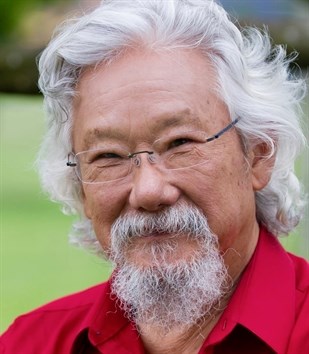
David Suzuki
Image Credit: SUBMITTED/David Suzuki Foundation
January 29, 2020 - 1:45 PM
OPINION
If we’re going to tackle the climate crisis, we have to reduce transportation emissions. Good public transit — fast, reliable, affordable — can help by weaning us off of gasoline-burning automobiles.
Especially important to address the climate crisis is transit that runs on electricity, which could be subways, light rail or trolley and battery-powered buses.
Subways are only practical in population-dense cities such as Toronto, Montreal and Vancouver. Light rail is great in many settings. Calgary, Edmonton, Ottawa and Kitchener-Waterloo have light rail, and Toronto is building a crosstown system that will massively benefit the city, especially in neighbourhoods not currently well-served by rapid transit. But one vehicle is often overlooked: the all-electric bus.
E-buses have many virtues. They can be built quickly — no small thing during the escalating climate emergency.
Bus electrification is part of an overall move to electrify most of our economy. David Suzuki Foundation policy analyst Tom Green’s 2019 report, “Zeroing in on Emissions,” says we need to “electrify just about everything.” He writes, “Multiple research projects have concluded that electrifying as much as possible will be a pillar of Canada’s decarbonization effort.”
Transportation is the second-largest source of Canadian greenhouse gases, eclipsed only by the oil and gas sector. In 2017 (the year with the most recent data), transportation in Canada accounted for a staggering 174 million tonnes of CO2 equivalent; oil and gas development contributed 195 million tonnes.
Emissions-reduction benefits of e-buses are considerable. Even in provinces like Alberta, where power is generated mostly by burning fossil fuels, electric buses stack up well against diesel. Clean Energy Canada, a think tank at Simon Fraser University, says, “When plugged into Edmonton’s grid, a battery-electric bus is expected to emit 38% to 44% less CO2 than a diesel equivalent — and as the electricity gets cleaner, so will the buses.” A 2019 David Suzuki Foundation report, “Shifting Gears,” states, “Electrification of buses would further reduce the GHG impacts of transit use.”
E-bus production can also strengthen Canada’s clean tech sector and create jobs. Our country has a number of companies that produce vehicles for domestic and international markets. New federal funding could give these businesses — including Quebec-based Nova Bus and Winnipeg’s New Flyer Industries — an additional boost.
There could even be benefits for national unity. The buses could support manufacturers and transit riders throughout the country, demonstrate Ottawa’s commitment to ensuring all regions reach their potential and advertise the message, “This clean-air transit service supported by the Government of Canada.”
It’s something the federal government should consider seriously as it prepares this year’s federal budget.
During the election, the Liberals — who formed a minority government — pledged to make transit funding permanent (as opposed to occasional) and said this money would increase by $3 billion annually. They also said that, starting in a few years, transit investments would be for buses and rail that don’t emit carbon.
The prime minister’s mandate letter to Infrastructure Minister Catherine McKenna tasked her with fulfilling these promises: “Make the federal commitment to fund public transit permanent and rise with the cost of construction over time. Ensure that new federal investments in public transit are used to support zero-emission buses and rail systems starting in 2023.”
These are good policies, and we need to ensure they’re implemented — even enhanced — quickly. Scientists tell us we must reduce emissions dramatically within the decade.
To capture these opportunities and prevent electric bus manufacturing from going to the U.S., the government needs to act fast. Clean Energy Canada argues, “Canada is home to multiple North-America-leading e-bus manufacturers that, as the world moves to electrify transit, are well-positioned to capitalize — provided transit authorities and policy makers seize the opportunity.”
Some cities have already purchased e-buses, but the numbers are relatively small. Toronto just bought 60 (out of a total fleet of some 2,000 buses) and Edmonton recently ordered 40 (out of about 1,000). These are good steps, but new federal money could turbocharge them.
Ottawa plans to fund zero-emission vehicles beginning in 2023. This means the feds could pay for diesel-burning buses for another three years. In a climate crisis, that doesn’t make sense.
Canadian technology can produce high-quality electric buses (and good jobs) now. In the upcoming federal budget, let’s make cleaner, healthier public transportation a priority.
— David Suzuki is a scientist, broadcaster, author and co-founder of the David Suzuki Foundation. Written with contributions from David Suzuki Foundation Climate Change and Transportation Policy Analyst Gideon Forman.
We welcome your comments and opinions on our stories but play nice. We won't censor or delete comments unless they contain off-topic statements or links, unnecessary vulgarity, false facts, spam or obviously fake profiles. If you have any concerns about what you see in comments, email the editor.
News from © The Canadian Press, 2020